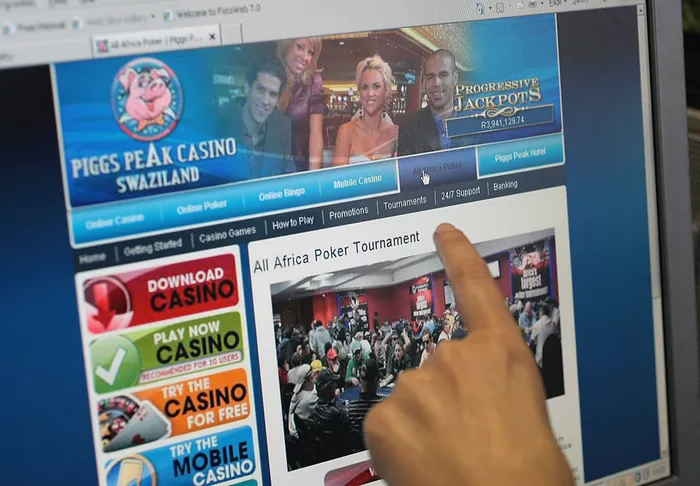
Treasury discussion paper titled "The Case for a National Online Gambling Tax" and released on Tuesday, reveals that government is weighing the introduction of a 20% national levy on gross gambling revenue (GGR) from online betting and any future interactive gambling activities.
Image: File
South Africa is considering one of its most significant gambling policy shifts in decades, with the National Treasury proposing a new national tax on online and interactive gambling amid explosive growth in the digital betting industry and rising concerns about social harm.
If adopted, the national tax would mark the most far-reaching reform of South Africa’s gambling tax framework since the mid-1990s.
Treasury discussion paper titled "The Case for a National Online Gambling Tax" and released on Tuesday, reveals that government is weighing the introduction of a 20% national levy on gross gambling revenue (GGR) from online betting and any future interactive gambling activities.
This would be imposed in addition to existing provincial gambling taxes, potentially lifting the combined tax burden on operators to between 26% and 29%.
Treasury argues that the rapid expansion of online gambling, now available “anywhere, at any time”, has outpaced South Africa’s regulatory framework, creating gaps that increase the risk of problem gambling, addiction, and associated social costs.
According to the National Gambling Board’s latest data, gambling turnover soared to R1.5 trillion in 2024/25, up 31% from the R1.43trln generated during the previous financial year. Betting accounted for a staggering 75% of all wagering, driven overwhelmingly by online platforms. Of the R51.97 billion in betting GGR, 85.5% came from online betting.
Physical casinos - once the dominant force in the gambling market - have declined sharply, slipping from a 39% market share in 2020/21 to just 22% today.
Young South Africans are driving the surge. Gambling prevalence, particularly on sports betting apps, has more than doubled since 2017, with the 25–34 age group being the most active.
While online betting on sports and horseracing through licensed bookmakers is legitimate, interactive gambling, such as online casino games, remains illegal. Enforcement is proving difficult as offshore operators target South African players, often without oversight.
"Like with most other jurisdictions, it is exceedingly difficult to completely stop operators from outside of South Africa targeting or accepting play from South African players," Treasury said.
"The country does, however, have an exchange control regime where Authorised Dealers are required to decline any request to purchase foreign currency to participate in offshore gambling activities."
Treasury said attempts to regulate interactive gambling date back to the National Gambling Amendment Act of 2008, which Parliament passed but was never implemented. Meanwhile, technology has dramatically changed the industry, leaving regulators unable to fully protect vulnerable consumers.
Treasury frames the proposed tax as a tool to internalise the negative externalities associated with gambling—such as family breakdown, over-indebtedness, mental health issues, and crime.
“Problem and pathological gambling impose a cost on society,” the paper notes, arguing that a higher national tax would serve both as a deterrent and a funding mechanism for public interventions.
While provinces already tax gambling—typically 6–15% depending on the product—Treasury warns that fragmented provincial rates could trigger a “race to the bottom,” with operators flocking to provinces with the lowest tax burdens.
At current levels of online gambling revenue, Treasury estimates that the new tax could bring in over R10bn annually. However, it stresses that the primary aim is not revenue collection, but harm reduction.
A recent study commissioned by the SA Bookmakers' Association revealed that illegal online gambling is now draining the economy of more than R50bn a year, with unlicensed offshore operators now accounting for nearly two-thirds of all online gambling activity in the country.
Treasury said a national tax would standardise the tax base across all forms of online gambling, capture revenue from interactive gambling, if legalised in future, reduce opportunities for provincial competition on tax rates, and strengthen enforcement by placing the SA Revenue Services at the centre of compliance.
Treasury said that globally, online gambling taxes vary widely, with some countries charging more than 50% of GGR, adding that South Africa’s proposed 20% national rate would align with markets such as the UK, New Zealand, Kenya, and several US states.
However, Treasury also acknowledges the risks, highlighting that Kenya’s experience showed that overly aggressive taxes can push gamblers toward offshore, untaxed platforms—undermining both revenue and regulation.
Stakeholders across the gambling industry, including provincial regulators, bookmakers, casinos, and consumer advocacy groups, are expected to submit comments in the coming months.
However, the gambling industry has warned of constitutional overreach, legal contradictions and offshore migration risks over the proposed tax.
The South African Responsible Online Gambling Association (Saroga) on Wednesday sharply criticised the proposal, saying the measure attempts to tax an industry that still lacks a coherent national legal framework and risks undermining the Constitution’s provincial powers over gambling regulation.
In a strongly worded analysis, Wayne Lurie, director at Lurie Inc Attorneys and head of Saroga, said Treasury’s discussion paper — released without warning on 25 November — “reads, on the surface, like a neat solution,” but collapses under scrutiny.
"South Africa is being asked to support a national online gambling tax at a moment when we still do not have a coherent, implemented national online gambling law," Lurie said.
"If national government wants to redesign that settlement, the honest route is to revisit the National Gambling Act and the 2008 Amendment or, more sensibly, start again and finish the job, not to squeeze the same tax base from above."
Saroga warns that pushing legally licensed operators into a near-30% combined tax burden, while the illegal offshore market remains largely untouched, could drive players into unregulated channels.
"Where governments have set very high headline tax rates on gambling without a realistic view of enforcement, players have simply migrated to offshore sites," Lurie said.
"High rates imposed on a partially legal, poorly enforced market lead to a shrinking domestic tax base and a thriving parallel market that is almost impossible to police."
BUSINESS REPORT